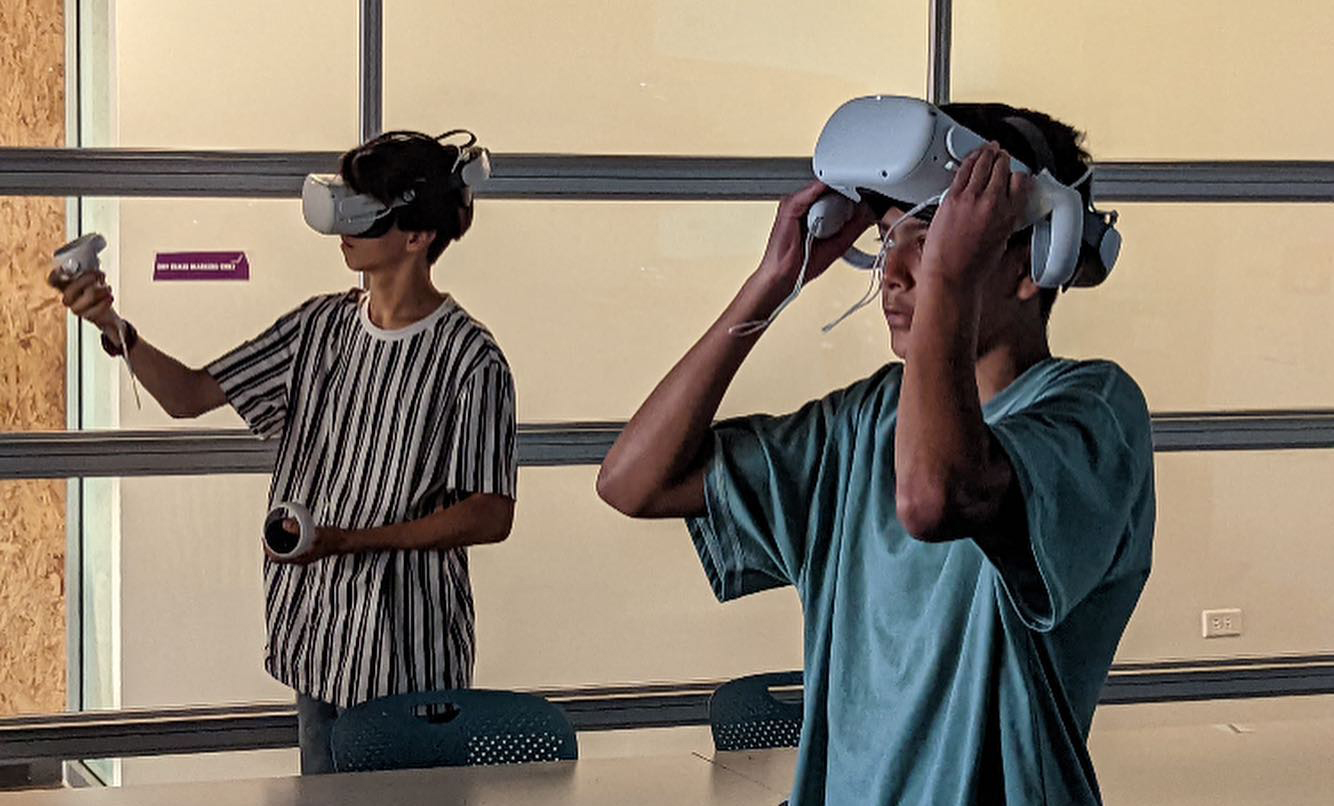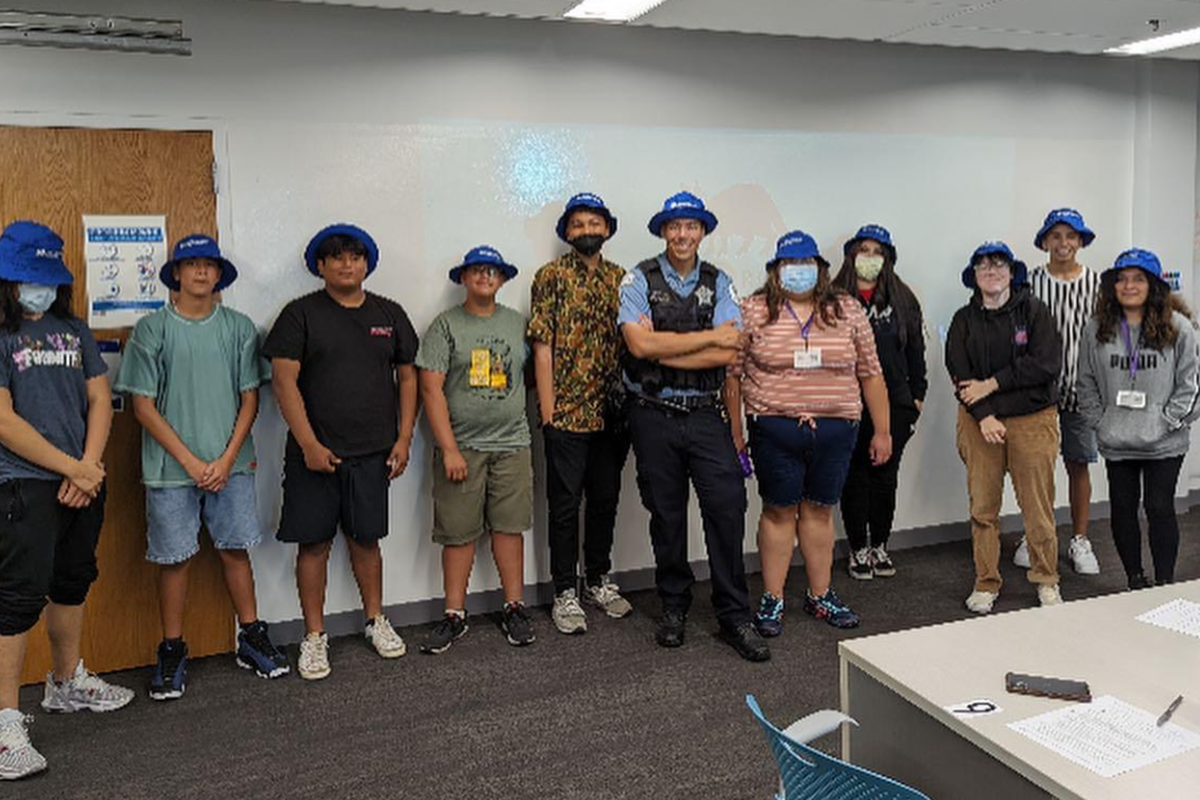 As part of a revamped Chicago Police Explorer program, youth participants spent the summer learning about different career paths, including the realm of technology and communication thanks to the tools in DePaul's Virtual and Augmented Reality Communication Lab. (Image courtesy of Jesus Magallon)
As part of a revamped Chicago Police Explorer program, youth participants spent the summer learning about different career paths, including the realm of technology and communication thanks to the tools in DePaul's Virtual and Augmented Reality Communication Lab. (Image courtesy of Jesus Magallon)When Jesus Magallon stepped into his role last year as the youth liaison officer in the Chicago Police Department’s 25th District, he immediately began looking for ways to reshape the Chicago Police Explorer program to fit the needs of the district's youth community.
“I tried to be mindful of having an innovative and project-based mindset, with an emphasis on problem solving skills and career readiness,” Magallon says. In addition to his role with CPD, Magallon also is a doctoral student in DePaul’s College of Education pursuing a degree in educational leadership.
His new structure for the six-week summer program highlighted different career themes, exposing the youth participants to different professions using hands-on experience.
“During the first week, titled ‘Emergency Medicine,’ a nurse from Loyola’s emergency medicine program joined us and brought dummies for students to practice CPR and tourniquets for first aid,” Magallon says. “Week two focused on law. Representatives from the Cook County State's Attorney's office presided over a mock trial put on by the students.”  During Jesus Magallon's (sixth from right) revamped Chicago Police Explorer program, youth participants got hands on experience with the tools in DePaul's Virtual and Augmented Reality Communication Lab. (Image courtesy of Jesus Magallon)
During Jesus Magallon's (sixth from right) revamped Chicago Police Explorer program, youth participants got hands on experience with the tools in DePaul's Virtual and Augmented Reality Communication Lab. (Image courtesy of Jesus Magallon)
Magallon tapped into his Blue Demon network for the third week of the program, titled “Technology, Ethics and Application.” Having read about DePaul’s Virtual and Augmented Reality Communication Lab, Magallon asked Paul Booth, a professor in the College of Communication, to join his class.
“I hope that by emphasizing the intersection of technology and empathy, the students saw how new technology has everyday applications,” says Booth, who leads the lab at DePaul.
The aim of the VARC Lab is to help people learn how to effectively and ethically communicate in VR and AR. The lab is a space for students and faculty to experience VR/AR technology firsthand and explore how these tools impact society, culture, media and interpersonal relationships.
During the week-three session, students got to test out some VR equipment, an activity Magallon felt was important.
“A big interest of mine is making sure students from our marginalized communities have access to technology and data,” he says. “Through Paul’s talk and the day’s workshop, the students got to explore technology they likely have never experienced before and may even have found a career spark in the intersection of communication and technology.”
While the summer program has since come to an end, Magallon notes it would not have been possible without numerous collaborations from across the city.
“I've come to relish the diverse partnerships with our community partners, such as After School Matters and DePaul. Forging these 'off-beat' triangular partnerships can provide distinctive experiences and innovative pathways for problem solving,” he says. “Finally, none of this would have been possible without the support of my 25th district community policing team; my district commander, Adnardo Gutierrez; and community policing supervisor, Sergeant Luis Gonzalez, who understand our youth deserve diverse educational experiences.”
As Magallon continues to address technology literacy in Chicago's west side youth communities, he welcomes collaboration from faculty, staff, students, alumni and other university partners.
"I currently am trying to set up coding, app and game development, and augmented reality workshops and would love the opportunity to brainstorm with Blue Demon tech partners," he notes. "My hope is to tap into Chicago's technology scene to make technology literacy a reality for all."
Rachel Wojnicki is an editor of Newsline and the internal communications manager for University Marketing and Communications.